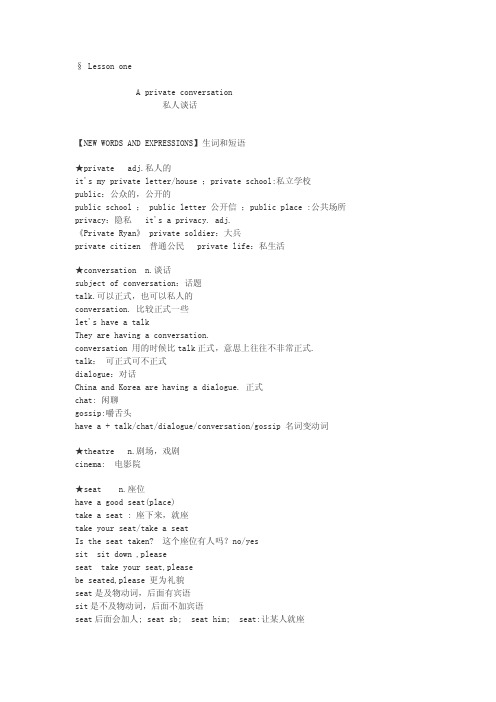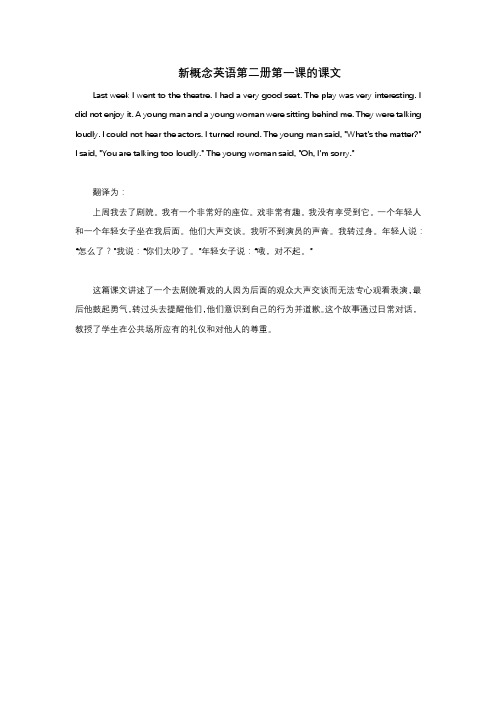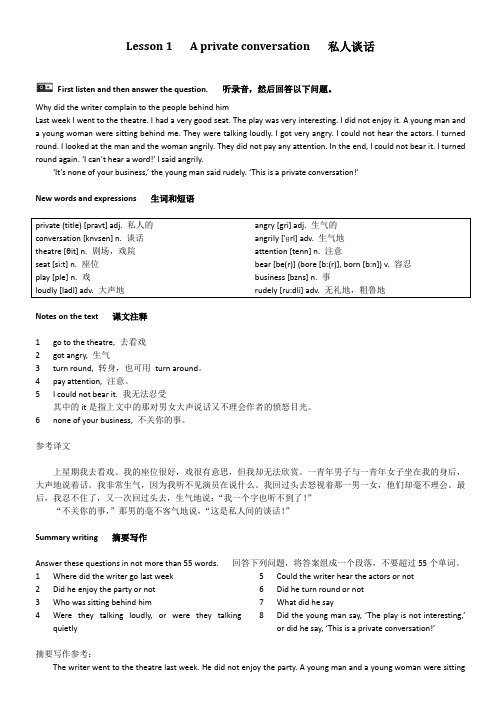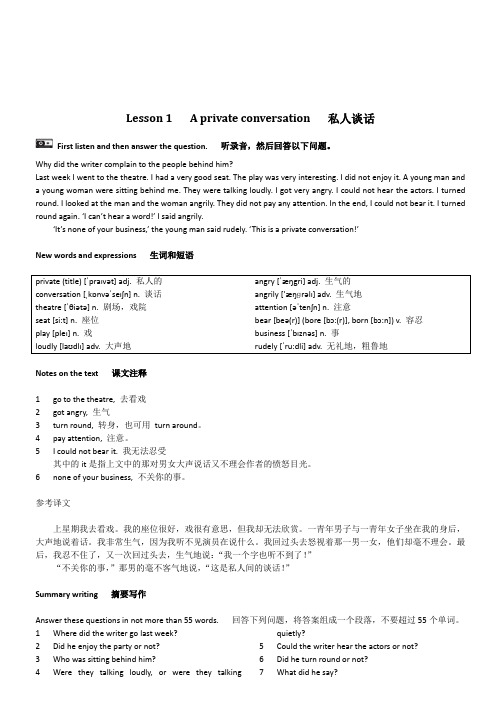新概念二第1课 课文及答案精编版
新概念英语第二册课后练习答案lesson1

§Lesson oneA private conversation私人谈话【NEW WORDS AND EXPRESSIONS】生词和短语★private adj.私人的it's my private letter/house;private school:私立学校public:公众的,公开的public school;public letter公开信;public place:公共场所privacy:隐私it's a privacy.adj.《Private Ryan》private soldier:大兵private citizen普通公民private life:私生活★conversation n.谈话subject of conversation:话题talk.可以正式,也可以私人的conversation.比较正式一些let's have a talkThey are having a conversation.conversation用的时候比talk正式,意思上往往不非常正式.talk:可正式可不正式dialogue:对话China and Korea are having a dialogue.正式chat:闲聊gossip:嚼舌头have a+talk/chat/dialogue/conversation/gossip名词变动词★theatre n.剧场,戏剧cinema:电影院★seat n.座位have a good seat(place)take a seat:座下来,就座take your seat/take a seatIs the seat taken?这个座位有人吗?no/yessit sit down,pleaseseat take your seat,pleasebe seated,please更为礼貌seat是及物动词,后面有宾语sit是不及物动词,后面不加宾语seat后面会加人;seat sb;seat him;seat:让某人就座sit he is sitting there.you seat him;〖语法精粹〗4.When all those present(到场者)_D_he began his lecture.(重点题)A.sitB.setC.seatedD.were seaedsit,sit down;seat,be seated;take a seat★play n.戏★loudly adv.大声的★angry adj.生气的cross=angry;I was angry.He was cross.annoyed:恼火的;I was annoyed.I was angry/cross.I was very angry.be blue in the face;I am blue in the face.★angrily adv.生气的副词修饰动词★attention n.注意Attention,please.请注意pay attention:注意pay attention to:对什么注意You must pay attention to that gril.pay a little attention:稍加注意pay much attention:多加注意pay more attention:更多注意pay no attention:不用注意★bear(bore,borne)v.容忍bear,standI can't bear/stand youendure:忍受,容忍put up with:忍受I got divorced.I could not put up with himbear/stand/endure忍受的极限在加大put up with=bear=standbear n.熊white bearbear hog:热情(热烈)的拥抱give sb a bear hug★business n.事business man:生意人do business:做生意go to some place on business:因公出差I went to Tianjin on business.thing可以指事情,也可以指东西It's my business私人事情it's none of your business★rudely adv.无礼地,粗鲁地rude adj.【TEXT】Last week I went to the theatre.I had a very good seat.The play was very interesting.I did not enjoy it.A young man anda young woman were sitting behind me.They were talking loudly.I got very angry.I could not hear the actors.I turnedround.I looked at the man and the woman angrily.They did not pay any attention. In the end,I could not bear it.I turnedround again."I can't hear a word!"I said angrily."It's none of your business,"the young man said rudely."This is a private conversation!"参考译文上星期我去看戏。
新概念英语第二册课后练习答案lesson1

§Lesson oneA private conversation私人谈话【NEW WORDS AND EXPRESSIONS】生词和短语★private adj.私人的it's my private letter/house;private school:私立学校public:公众的,公开的public school;public letter公开信;public place:公共场所privacy:隐私it's a privacy.adj.《Private Ryan》private soldier:大兵private citizen普通公民private life:私生活★conversation n.谈话subject of conversation:话题talk.可以正式,也可以私人的conversation.比较正式一些let's have a talkThey are having a conversation.conversation用的时候比talk正式,意思上往往不非常正式.talk:可正式可不正式dialogue:对话China and Korea are having a dialogue.正式chat:闲聊gossip:嚼舌头have a+talk/chat/dialogue/conversation/gossip名词变动词★theatre n.剧场,戏剧cinema:电影院★seat n.座位have a good seat(place)take a seat:座下来,就座take your seat/take a seatIs the seat taken?这个座位有人吗?no/yessit sit down,pleaseseat take your seat,pleasebe seated,please更为礼貌seat是及物动词,后面有宾语sit是不及物动词,后面不加宾语seat后面会加人;seat sb;seat him;seat:让某人就座sit he is sitting there.you seat him;〖语法精粹〗4.When all those present(到场者)_D_he began his lecture.(重点题)A.sitB.setC.seatedD.were seaedsit,sit down;seat,be seated;take a seat★play n.戏★loudly adv.大声的★angry adj.生气的cross=angry;I was angry.He was cross.annoyed:恼火的;I was annoyed.I was angry/cross.I was very angry.be blue in the face;I am blue in the face.★angrily adv.生气的副词修饰动词★attention n.注意Attention,please.请注意pay attention:注意pay attention to:对什么注意You must pay attention to that gril.pay a little attention:稍加注意pay much attention:多加注意pay more attention:更多注意pay no attention:不用注意★bear(bore,borne)v.容忍bear,standI can't bear/stand youendure:忍受,容忍put up with:忍受I got divorced.I could not put up with himbear/stand/endure忍受的极限在加大put up with=bear=standbear n.熊white bearbear hog:热情(热烈)的拥抱give sb a bear hug★business n.事business man:生意人do business:做生意go to some place on business:因公出差I went to Tianjin on business.thing可以指事情,也可以指东西It's my business私人事情it's none of your business★rudely adv.无礼地,粗鲁地rude adj.【TEXT】Last week I went to the theatre.I had a very good seat.The play was very interesting.I did not enjoy it.A young man anda young woman were sitting behind me.They were talking loudly.I got very angry.I could not hear the actors.I turnedround.I looked at the man and the woman angrily.They did not pay any attention. In the end,I could not bear it.I turnedround again."I can't hear a word!"I said angrily."It's none of your business,"the young man said rudely."This is a private conversation!"参考译文上星期我去看戏。
概二第一课原文

新概念英语第二册第一课的课文
Last week I went to the theatre. I had a very good seat. The play was very interesting. I did not enjoy it. A young man and a young woman were sitting behind me. They were talking loudly. I could not hear the actors. I turned round. The young man said, "What's the matter?"
I said, "You are talking too loudly." The young woman said, "Oh, I'm sorry."
翻译为:
上周我去了剧院。
我有一个非常好的座位。
戏非常有趣。
我没有享受到它。
一个年轻人和一个年轻女子坐在我后面。
他们大声交谈。
我听不到演员的声音。
我转过身。
年轻人说:“怎么了?”我说:“你们太吵了。
”年轻女子说:“哦,对不起。
”
这篇课文讲述了一个去剧院看戏的人因为后面的观众大声交谈而无法专心观看表演,最后他鼓起勇气,转过头去提醒他们,他们意识到自己的行为并道歉。
这个故事通过日常对话,教授了学生在公共场所应有的礼仪和对他人的尊重。
新概念二第1课课文及答案

Lesson 1 A private conversation 私人谈话First listen and then answer the question. 听录音,然后回答以下问题。
Why did the writer complain to the people behind himLast week I went to the theatre. I had a very good seat. The play was very interesting. I did not enjoy it. A young man and a young woman were sitting behind me. They were talking loudly. I got very angry. I could not hear the actors. I turned round. I looked at the man and the woman angrily. They did not pay any attention. In the end, I could not bear it. I turned round again. ‘I can’t hear a word!’ I said angrily.‘It’s none of your business,’ the young man said rudely. ‘This is a private conversation!’New words and expressions 生词和短语private (title) [pravt] adj. 私人的angry [gri] adj. 生气的conversation [knvsen] n. 谈话angrily ['ɡrl] adv. 生气地theatre [θit] n. 剧场,戏院attention [tenn] n. 注意seat [si:t] n. 座位bear [be(r)] (bore [b:(r)], born [b:n]) v. 容忍play [ple] n. 戏business [bzns] n. 事loudly [ladl] adv. 大声地rudely [ru:dli] adv. 无礼地,粗鲁地Notes on the text 课文注释1 go to the theatre, 去看戏2 got angry, 生气3 turn round, 转身,也可用turn around。
新概念英语第二册第1课讲义(带答案)

新概念英语第二册第1课讲义(带答案)Lesson 1A private conrersation一、单词连连猜二、七滋八味品语法三、我行我do 秀课文Last week I to the theatre. I a very good seat. The play very interesting.I not enjoy it. A young man and a young woman were sitting behind me. They were talking loudly. I got very angry. I could not hear the actors. I turned round. I at the man and the woman angrily. They did not pay any attention. In the end, I could not bear it. I turned round again. ‘I can't hear a word!’ I said angrily. ‘It's,’ the young man said rudely. ‘This is a !’测试题一、单项选择1.There no theatre in my hometown fifty years ago.A.is B.are C.was D.were 2.did you go last night? - I went to a theatre.A.Who B.What C.How D.Where 3.Did he something?A.eat B.eats C.eating D.ate 4.The twins their mother do the housework everyday.A.are helping B.are looking C.help D.are wanting 5.Vivian guitar last year.A.learned B.learns C.learning D.is learning 6.I to learn English 10 years ago.A.begin B.began C.begun D.begins 7.He in HongKong last Sunday.A.arrive B.arrived C.arrives D.arriving 8.I like coffee and my sister either.A.don’t;don’t B.doesn’t;doesn’tC.don’t;doesn’t D.do; do9.Alice back home the day before yesterday.A.comes B.came C.comes D.was coming 10.I computer game yesterday.A.played B.play C.am playing D.was playing 二、句型转换1.The boy played basketball.否定句:.一般疑问句:?2.They sang in the classroom together.否定句:.一般疑问句:?3.Many people sat in the theatre.否定句:.一般疑问句:?4.I enjoyed the concert last night.否定句:.一般疑问句:?5.He could bear this loud noise.否定句:.一般疑问句:?答案一、1—5 CDACA 6—10 BBCBA二、1.The boy did not play basketball.Did the boy play basketball?2.They didn’t sing in the classroom together.Did they sing in the classroom together? 3.Many people didn’t sit in the theatre.Did many people sit in the theatre?4.I didn’t enjoy the concert last night.Did you enjoy the concert last night?5.He could not bear this loud noise.Could he bear this loud noise?。
新概念英语第二册lesson笔记和答案

新概念英语第二册l e s s o n1A n e x c i t i n g t r i pLesson 1 A private conversation课文内容:Last week I went to the theatre. I had a very good seat. The play was very interesting. I did not enjoy it. A young man and a young woman were sitting behind me. They were talking loudly. I got very angry. I could not hear the actors. I turned round. I looked at the man and the woman angrily. They did not pay any attention. In the end, I could not bear it. I turned round again. ‘I can't hear a word!’ I said angrily.‘It's none of your business, ’ the young man said rudely. ‘This is a private conversation!’Notes on the text 课文注释1 go to the theatre,去看戏。
2 got angry,生气。
3 turn round,转身,也可用turn around。
4 pay attention,注意。
5 I could not bear it.我无法忍受。
其中的it是指上文中的那对男女大声说话又不理会作者的愤怒目光。
6 none of your business,不关你的事。
参考译文:上星期我去看戏。
新概念二第1课-课文及答案

新概念二第1课-课文及答案Lesson 1 A private conversation 私人谈话First listen and then answer the question. 听录音,然后回答以下问题。
Why did the writer complain to the people behind him? Last week I went to the theatre. I had a very good seat. The play was very interesting. I did not enjoy it. A young man and a young woman were sitting behind me. They were talking loudly. I got very angry. I could not hear the actors. I turned round. I looked at the man and the woman angrily. They did not pay any attention. In the end, I could not bear it. I turned round again. ‘I can’t hear a word!’ I said angrily.‘It’s none of your business,’ the young man said rudely. ‘This is a private conversation!’New words and expressions 生词和短语Notes on the text 课文注释1 go to the theatre, 去看戏2 got angry, 生气3 turn round, 转身,也可用 turn around。
4 pay attention, 注意。
新概念二第1课 课文及答案

Lesson 1 A private conversation 私人谈话First listen and then answer the question. 听录音,然后回答以下问题。
Why did the writer complain to the people behind him?Last week I went to the theatre. I had a very good seat. The play was very interesting. I did not enjoy it. A young man and a young woman were sitting behind me. They were talking loudly. I got very angry. I could not hear the actors. I turned round. I looked at the man and the woman angrily. They did not pay any attention. In the end, I could not bear it. I turned round again. ‘I can’t hear a word!’ I said angrily.‘It’s none of your business,’ the young man said rudely. ‘This is a private conversation!’New words and expressions 生词和短语Notes on the text 课文注释1 go to the theatre, 去看戏2 got angry, 生气3 turn round, 转身,也可用turn around。
4 pay attention, 注意。
5 I could not bear it. 我无法忍受其中的it是指上文中的那对男女大声说话又不理会作者的愤怒目光。
- 1、下载文档前请自行甄别文档内容的完整性,平台不提供额外的编辑、内容补充、找答案等附加服务。
- 2、"仅部分预览"的文档,不可在线预览部分如存在完整性等问题,可反馈申请退款(可完整预览的文档不适用该条件!)。
- 3、如文档侵犯您的权益,请联系客服反馈,我们会尽快为您处理(人工客服工作时间:9:00-18:30)。
Lesson 1 A private conversation 私人谈话First listen and then answer the question. 听录音,然后回答以下问题。
Why did the writer complain to the people behind him?Last week I went to the theatre. I had a very good seat. The play was very interesting. I did not enjoy it. A young man and a young woman were sitting behind me. They were talking loudly. I got very angry. I could not hear the actors. I turned round. I looked at the man and the woman angrily. They did not pay any attention. In the end, I could not bear it. I turned round again. ‘I can’t hear a word!’ I said angrily.‘It’s none of your business,’ the young man said rudely. ‘This is a private conversation!’New words and expressions 生词和短语Notes on the text 课文注释1 go to the theatre, 去看戏2 got angry, 生气3 turn round, 转身,也可用turn around。
4 pay attention, 注意。
5 I could not bear it. 我无法忍受其中的it是指上文中的那对男女大声说话又不理会作者的愤怒目光。
6 none of your business, 不关你的事。
参考译文上星期我去看戏。
我的座位很好,戏很有意思,但我却无法欣赏。
一青年男子与一青年女子坐在我的身后,大声地说着话。
我非常生气,因为我听不见演员在说什么。
我回过头去怒视着那一男一女,他们却毫不理会。
最后,我忍不住了,又一次回过头去,生气地说:“我一个字也听不到了!”“不关你的事,”那男的毫不客气地说,“这是私人间的谈话!”Summary writing 摘要写作Answer these questions in not more than 55 words. 回答下列问题,将答案组成一个段落,不要超过55个单词。
1 Where did the writer go last week?2 Did he enjoy the party or not?3 Who was sitting behind him?4 Were they talking loudly, or were they talkingquietly? 5 Could the writer hear the actors or not?6 Did he turn round or not?7 What did he say?8 Did the young man say, ‘The play is not interesting,’or did he say, ‘This is a private conversation!’?摘要写作参考:The writer went to the theatre last week. He did not enjoy the party. A young man and a young woman were sittingbehind him. They were talking loudly. The writer could not hear the actors. He turned round. ‘I can’t hear a word!’ He said. ‘This is a private conversation!’ the young man said.(55 words)Key structures 关键句型Word order in simple statements 简单陈述句的语序a A statement tells us about something. All the sentences in the passage are statements. Each of these statementscontains one idea. Each statement tells us about one thing. A statement that tells us about one thing is a simple statement.陈述句用来叙述一件事情。
本段课文中的所有句子都是陈述句。
每个句子包含着一个概念,告诉我们一件事情。
凡是叙述一件事情的陈述句都是简单陈述句。
b The order of the words in a statement is very important. Look at these two statements. They both contain the wordsbut they do not mean the same thing:陈述句的语序很重要,注意下面两个句子,每句话所用的单词相同,但句子所表达的意思不同:The policeman arrested the thief. 警察逮捕了小偷。
The thief arrested the policeman. 小偷逮捕了警察。
c A simple statement can have six parts, but it does not always have so many. Study the order of the words in thefollowing columns. Note that column 6 (When?) can be at the beginning or at the end of a statement.一个简单陈述句可以由6部分组成,但是并不是每个句子都有这么多组成部分。
注意下表中句子的语序。
第6栏(表示时间)可以放在句首或句尾。
Exercises 练习A Rule seven columns on a double sheet of paper. At the top of each column, write the numbers and the words givenin the Table below. Copy out the rest of the passage. Put the words of each statement in the correct column in the way shown in the Table.在一张大纸上画出7栏,在前两行相应的栏内填入下表中第1、2行的数字和关键词,将课文中其他句子也注释:本课的关键句型是简单陈述句。
陈述句是用来叙述一件事情的句子。
每个句子包含一个概念,告诉我们一件事情。
一个简单陈述句可以由6部分组成,但是并不是每个句子都有那么多部分。
这6部分的顺序应该是:主语/动词/宾语或补语/方式状语/地点状语/时间状语(Subject/Verb/Object or Complement/Manner/Place/Time)。
时间状语可以放在句尾,也可以放在句首:The children played games quietly in their room yesterday.主/动/宾/方式/地点/时间Last week I went to the theatre.时间/主/动/地点B Use the seven columns again for this exercise. There is a line under each word or group of words in the statementsbelow. The words are not in the right order. Arrange them correctly in the seven columns. Look at this example:I last year to America went.The correct order is: I (who) went (action) to America (where) last year (when).Or: Last year I went to America.12 carefully.3 played.4 quietly.5 opened.6 he.7 planted.8 he read.9 borrowed.1011121314 draws.1516 last year.1718Multiple choice questions 多项选择题Comprehension 理解1 The writer turned round. He looked at the man and the woman angrily _____.(a) and they stopped talking (b) but they didn’t stop talking(c) but they didn’t notice him (d) but they looked at him rudely解析:选(b)最为正确。
因为(a)和(d)都与课文内容不符,也不合乎逻辑;(c)的意识是“他们没有注意他”,而作者的意图并不是想让他们注意他,而是想让他们停止谈话。
所以(b)最能表达作者当时心里的感受。
译文:作者回过头去。
他怒视着那一男一女,但是他们却没有停止谈话。
2 The young man said, ‘It’s none of your business.’(a) He was talking to the young woman.(b) He was talking to about the play.(c) He thought the writer was trying to listen to his conversation with the young woman.(d) He thought the writer was asking him a question.解析:选(c)。
